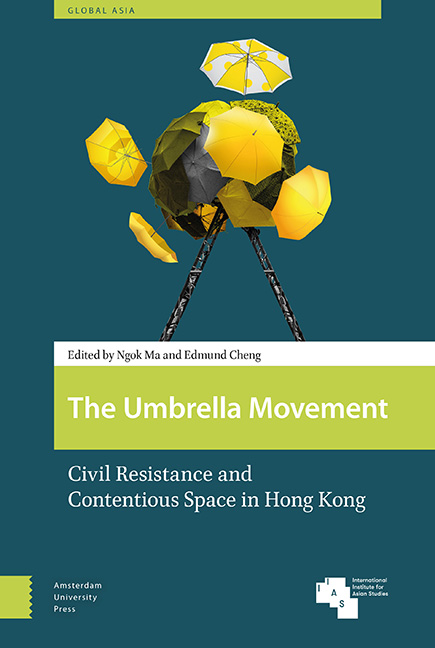Book contents
- Frontmatter
- Contents
- Acknowledgements
- Introduction: Civil Resistance and Contentious Space in Hong Kong
- Part A Trajectory and Contingency
- Part B Repertories and Strategies
- Part C Regime and Public Responses
- Part D Comparative Perspectives
- Appendix: The Umbrella Movement—Chronology of Major Events
- Index
- Publications/Global Asia
8 - Protesters and Tactical Escalation
Published online by Cambridge University Press: 21 November 2020
- Frontmatter
- Contents
- Acknowledgements
- Introduction: Civil Resistance and Contentious Space in Hong Kong
- Part A Trajectory and Contingency
- Part B Repertories and Strategies
- Part C Regime and Public Responses
- Part D Comparative Perspectives
- Appendix: The Umbrella Movement—Chronology of Major Events
- Index
- Publications/Global Asia
Summary
Abstract
Social groups that take to the streets do not necessarily achieve their desired effects because the protest may be weak. Hence, protesting groups need to carry out tactical escalation in order to empower their action. Examining the Umbrella Movement of 2014, this paper suggests that the effectiveness of tactical escalation is not determined only by the public support it can generate, but also by the timing of the escalation because this timing reveals the movement's momentum. The tactical escalation of the Umbrella Movement proved to be ineffective because some tactics damaged the movement's image or were undertaken at a time when the momentum was already significantly low.
Keywords: tactical escalation, Umbrella Movement, Hong Kong, movement momentum
Social groups that take to the streets to pursue their interests often lack effective institutional channels to otherwise achieve their aims. Protests by weak groups may not be effective precisely because they are weak. Weak groups may increase the power of their protests by using effective tactics to increase their bargaining power, generate public sympathy, or encourage other types of support. For example, a weak group can achieve success by causing major disruptions to socio-economic and political systems (Piven and Cloward, 1979: 29). Weak groups may also seek the support of external parties. Jenkins and Perrow point out that “[f]or a successful outcome, movements of the ‘powerless’ require strong and sustained outside support” (1977: 251). Tarrow (1998) suggests that allies are not only important for shaping the political opportunity for collective action, but also help protesters achieve success. “Challengers are encouraged to take collective action when they have allies who can act as friends in court, as guarantors against repression or as acceptable negotiators […] Allies are an external resource that otherwise resource-deficient social actors can sometimes depend upon” (Tarrow, 1988: 88). However, the adoption and effectiveness of protest tactics is determined by complex factors. The issue, then, is what determines the effectiveness of tactical escalation.
This chapter examines the effectiveness of tactical escalation during the Umbrella Movement in Hong Kong. It is suggested that tactical escalation failed to empower the movement as a whole.
- Type
- Chapter
- Information
- Umbrella MovementCivil Resistance and Contentious Space in Hong Kong, pp. 209 - 232Publisher: Amsterdam University PressPrint publication year: 2019



